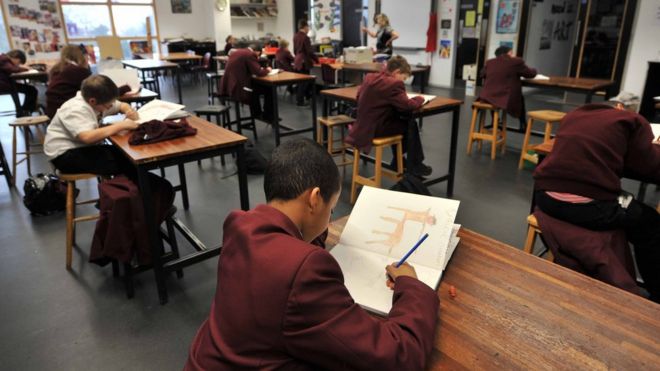
Teaching unions have welcomed the government’s decision to ditch plans to force all state schools in England to become academies.
They said the move was recognition that “one size” did not fit all schools.
Ministers said the government had listened to critics but the goal to turn schools into academies remained.
Schools judged by Ofsted to be good or outstanding will now not have to become academies, nor will small rural schools have to join a multi-academy trust.
The forced academisation proposals had been opposed by some Conservative MPs and councillors, as well as by unions and others.
The government argues that academies drive up standards by giving more power to head teachers and allowing them to be more innovative.
Critics have contended that academisation amounts to privatising the education system and say it is simplistic to say academies raise standards.
Cabinet minister Michael Fallon told BBC Radio 4’s Today programme: “We have now decided, having listened to parents and governors and our backbenchers that there is a better route to it, which is not forcing every school immediately to become an academy.”
He said academisation would now focus only on schools that were “clearly failing”.
Asked whether ministers had tried to “bury” the announcement on a busy day for news, Mr Fallon said it would not have been “legally” possible to issue it in the preceding days because of the “purdah” restrictions on the activities of civil servants in election periods.Paul Luxmoore, executive head teacher of the Coastal Academies Trust in Kent, told Today he was “dismayed” at the policy reversal.
“We’ve reached the tipping point, where local authorities – who have been delivering school improvements to schools until now – no longer have the capacity, or the money to do that effectively. Hence the government policy to make all schools academies over the next four years was entirely predictable and entirely sensible,” he said.
“I think they’ve lost their courage to go ahead with it because of all sorts of other political reasons [that have] very little to do with education.”
Andy Miller, head teacher at St Nicholas Church of England Primary School in Blackpool, said the forced academisation plan had been a mistake.
“I would argue that head teachers, their governing bodies and their parent community actually know what’s best for individual schools – rather than somebody in Westminster saying this is good for all of you,” he said.
‘Not rocket science’
National Association of Head Teachers president Kim Johnson said his organisation wanted ministers to understand “that actually there isn’t a case of one size fits all” for schools.
“We’re the intelligent practitioners and we want that opportunity, at the table with government, to further those discussions.”
Tory backbencher Graham Brady, who welcomed the abandonment of the plans, said that “the more that we can have these debates and discussions before legislation is brought forward, the better”.
Alasdair Smith, from campaign group Anti Academies Alliance, said: “We’ve known for more than 30 years exactly what improves schools, and it’s not rocket science, it’s high quality teaching and learning and good leadership.
“The government has not been pursuing that agenda, they’ve been pursuing structural change, and they’ve ignored high quality teaching, and high quality leadership, and that’s why the policy is now in tatters.”Academies are independently run – but state-funded – schools, overseen by a not-for-profit business, known as an academy trust. They are often part of a chain.
Shadow education secretary Lucy Powell said scrapping the plans was “frankly a humiliating climbdown for David Cameron and his education secretary”.
However, the government said it would push forward with compelling academy conversions in two areas:
- Where it is clear that the local authority can no longer viably support its remaining schools because too many schools have already become academies
- Where the local education authority consistently fails to meet a minimum performance threshold across its schools
The government also announced measures to protect small rural schools including extra financial support and a requirement that any closure would have to be agreed by the local authority and the regional schools commissioner.







